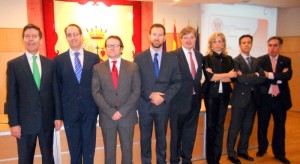About 200 experts, researchers and practitioners discuss ownership of goods abroad and money-laundering
 The managing partner of BROSETA, Luis Trigo, stressed during his speech at the seminar on “Tax residence, ownership of property abroad and money-laundering” held today at the Malaga College of lawyers, that in the fight against tax fraud “there may be special measures when it comes to offshoring”, however, “we have to seek prosecution mechanisms that do not have harmful side effects” making mention of the theory of the proportionality between the law and the collateral damage that it produces. In this sense, he noted that the “extension of the limitation periods can be one of these formulas”.
The managing partner of BROSETA, Luis Trigo, stressed during his speech at the seminar on “Tax residence, ownership of property abroad and money-laundering” held today at the Malaga College of lawyers, that in the fight against tax fraud “there may be special measures when it comes to offshoring”, however, “we have to seek prosecution mechanisms that do not have harmful side effects” making mention of the theory of the proportionality between the law and the collateral damage that it produces. In this sense, he noted that the “extension of the limitation periods can be one of these formulas”.
The meeting, organised by the BROSETA Chair of the University of Granada on “Control of tax fraud and money laundering prevention”, was inaugurated by the Vice Dean of the Malaga bar, Francisco Damián Vázquez, with the participation of Professor of Financial Law and Tax at the University of Málaga Juan José Hinojosa, and has brought together about 200 experts, researchers, academics and practitioners in this field to discuss issues such as tax obligations that have to be met by residents in Spain, whether Spanish or not, and who are holders of assets abroad, with special attention to the need to submit a disclosure statement on these assets.
The managing partner of BROSETA, Luis Trigo, referred also during his speech to this obligation to declare assets located outside of Spain and to the consequences of non-compliance, warning “the desirability of adapting the standard, once it has departed the deterrent role that it played in the extraordinary tax regularisation process, towards measures of proportionality that move away from the risk of incurring excesses which might lead to insurmountable legal judgments”.
In this regard, Professor of financial law and taxation of the University of Granada, Germán González, said “the severe and disproportionate treatment involving the lack of declaration of information by subjects bound to present it”, and “use of techniques to expose assets”, criticising its discrimination in respect of property situated in Spain, “resulting from difficulties within the criminal and tax principles in constitutional headquarters and even in its adaptation to European Union law”.
Furthermore, the partner of BROSETA, Carlos Diéguez, explained the substantive issues raised by the regulation and jurisprudential pronouncements on matters of tax crime and money-laundering, its connection with and the incidence of voluntary tax regularisation.
TRAINING AND RESEARCH
The continuing education of professionals and research were highlighted in the fight against tax fraud and the prevention of money laundering, as commented on by Francisco Damián Vázquez and Director of the BROSETA Chair of the Universidad of Granada, Carmen Almagro, who also emphasised the need to continue to investigate the underground economy, since “around 25% of GDP operations are beyond the control of the Treasury”.
In addition, the seminar on “Tax residence, ownership of property abroad and money-laundering”, that ended this meeting, counted among its speakers the Inspector Coordinator of the Special Delegation of Andalucia, Ceuta and Melilla from the AEAT, Luis Reche; the head of the inspection team of the special delegation of Andalucia, Ceuta and Melilla from the AEAT, Avelino González; the President of the Institute of Experts on Prevention of Money Laundering and Professor of the UGR, Juan Miguel del Cid; and the Deputy director of Customs and Excise of the AEAT, Javier Bello Perez, to look at some of the latest tax developments in terms of formal obligations on tenure and ownership of assets located abroad, and the existing – and future – rules on regulatory compliance in the area of prevention of money laundering.